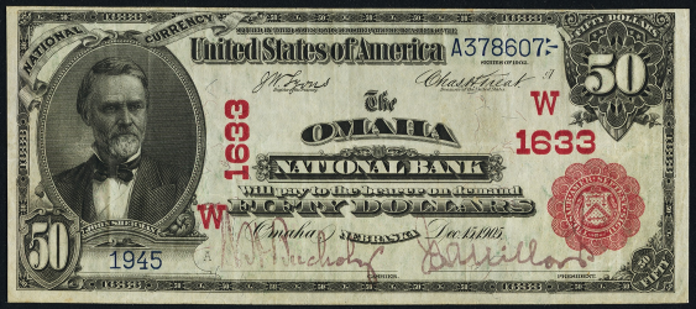Fifty Dollar Notes › Nationals › 1902 Fifty Dollar National Bank Notes › Kentucky Charters › 1902 $50 Greenville Kentucky First National Bank
Get Value Now
| Item | Info |
|---|---|
| Series | 1902 |
| Charter | #4356 First National Bank of Greenville, Kentucky |
| Year Chartered | 1890, 304 Banks Chartered |
| City Info | Greenville is a home rule-class city in Muhlenberg County, Kentucky, in the United States. It is the seat of its county. The population was 4,312 at the 2010 census. The town was settled in 1799 on an estate donated by local landowner William Campbell in order to establish a seat of government for a new county. Greenville was not established by the state assembly until 1812, however. It was incorporated as a city in 1848. Source: Wikipedia |
| Similar Cities | 28 banks with similar city. First 12 below: 1. Greenville, Pennsylvania - First National Bank 2. Greenville, Ohio - Farmers' National Bank 3. Greenville, Rhode Island - National Exchange Bank 4. Greenville, Illinois - First National Bank 5. Greenville, South Carolina - First National Bank 6. Greenville, Michigan - First National Bank 7. Greenville, Pennsylvania - Greenville National Bank 8. Greenville, Ohio - Second National Bank 9. Greenville, Texas - First National Bank 10. Greenville, Texas - Hunt County National Bank 11. Greenville, Michigan - City National Bank 12. Greenville, Texas - Greenville National Bank |
| Seal Varieties | Red, Blue |
| Other Info | 1. Value depends on notes known for charter, condition and market demand. |
| Neat Fact | Red Seals issued in sheets of 2 Notes: 1 $50 Note & $ $100 Note (Friedbergs, 20th Ed. P135) |
No Obligations Offers and Appraisals
Please submit a good photo or scan. It will be identified and evaluated. Understand there may be subtle differences between the image you see above and your note. Signatures, design, markings and note condition will determine the offer price. Notes in Uncirculated or better condition receive the best offers.
Appraisals can be estimated for wholesale and retail prices. Wholesale is what dealers typically pay. Retail is what a collector might pay. Retail is slightly higher in most cases.
Please visit this page for USA Paper Money Reference. Do not treat this page as a reference guide, it is for appraisal and acquisition purposes only.
